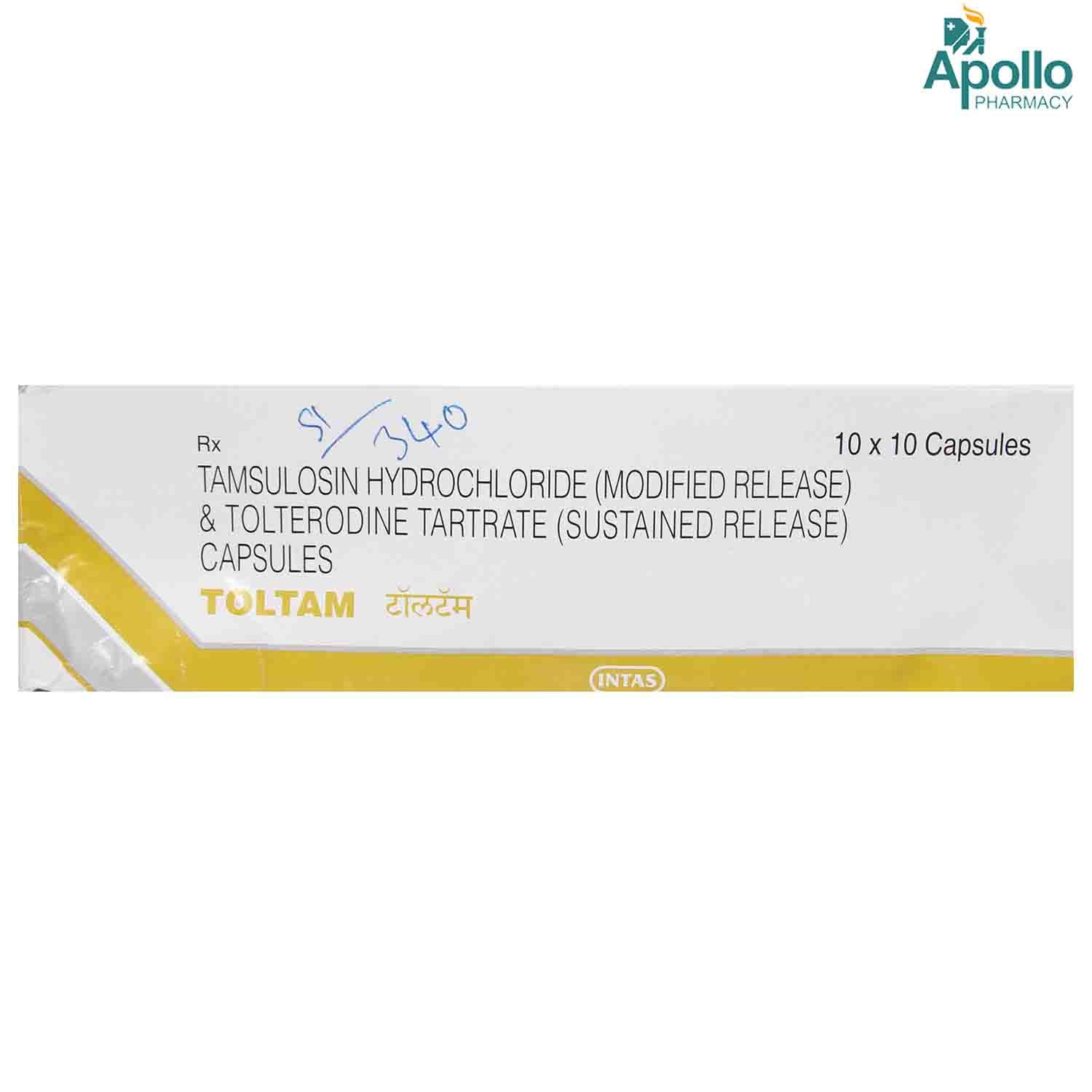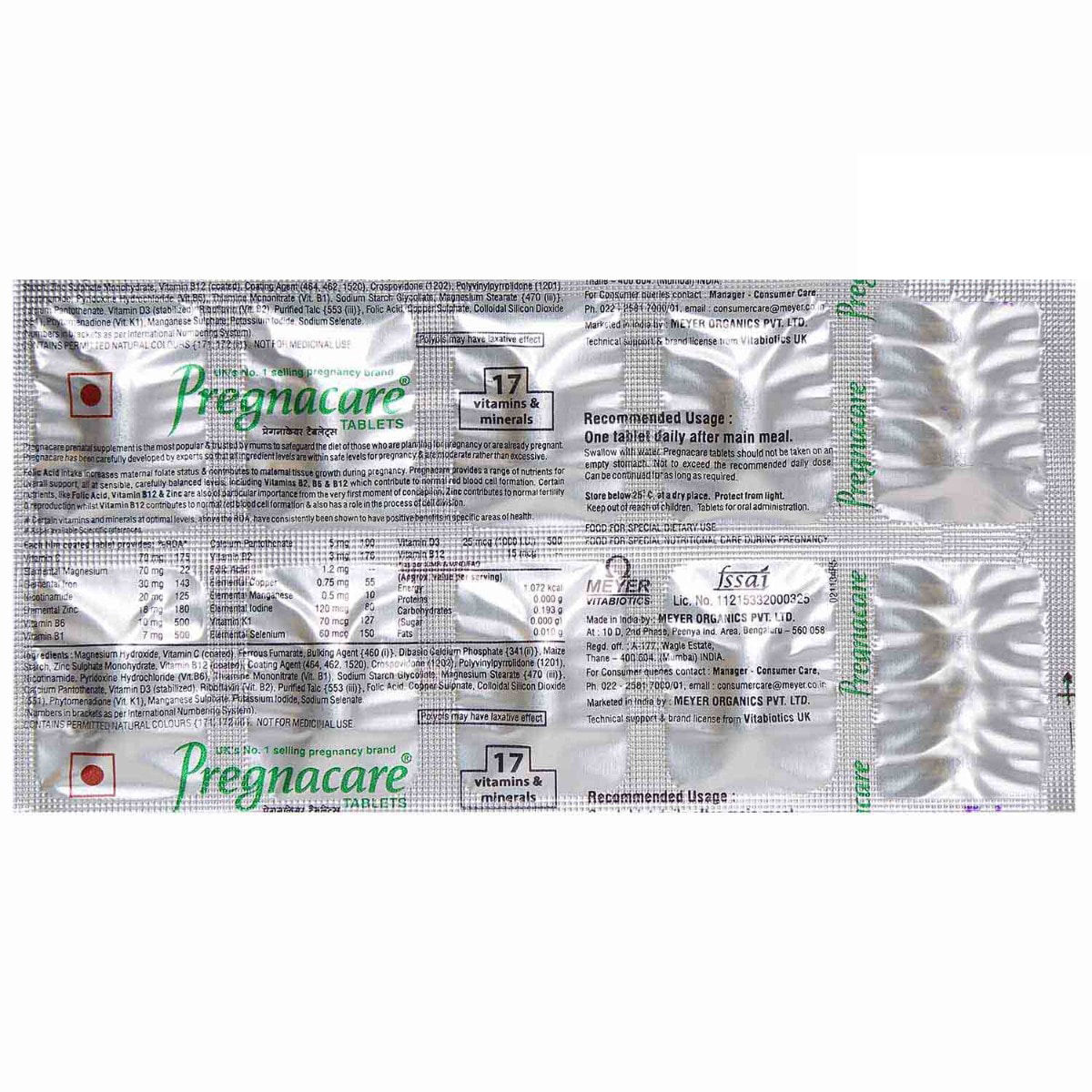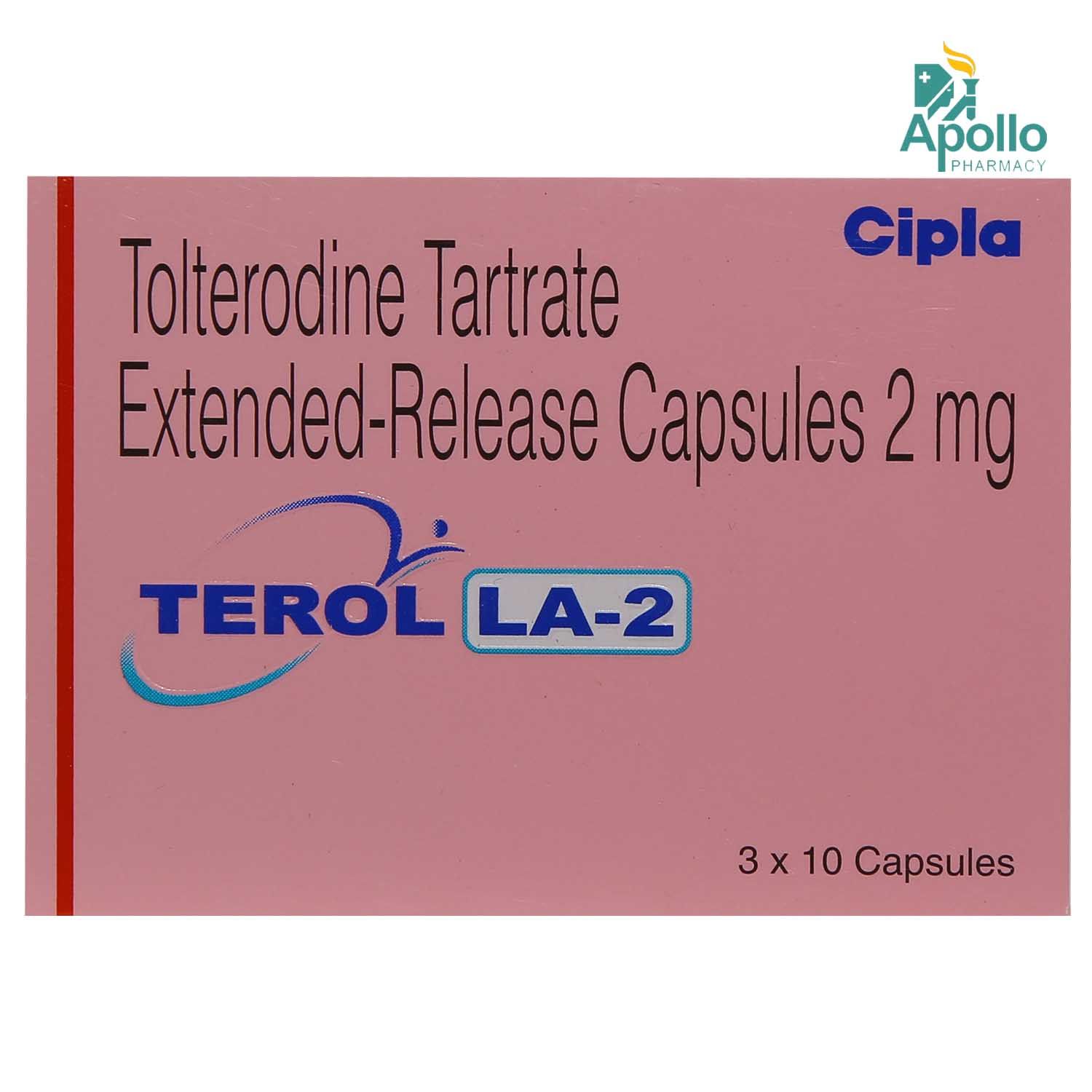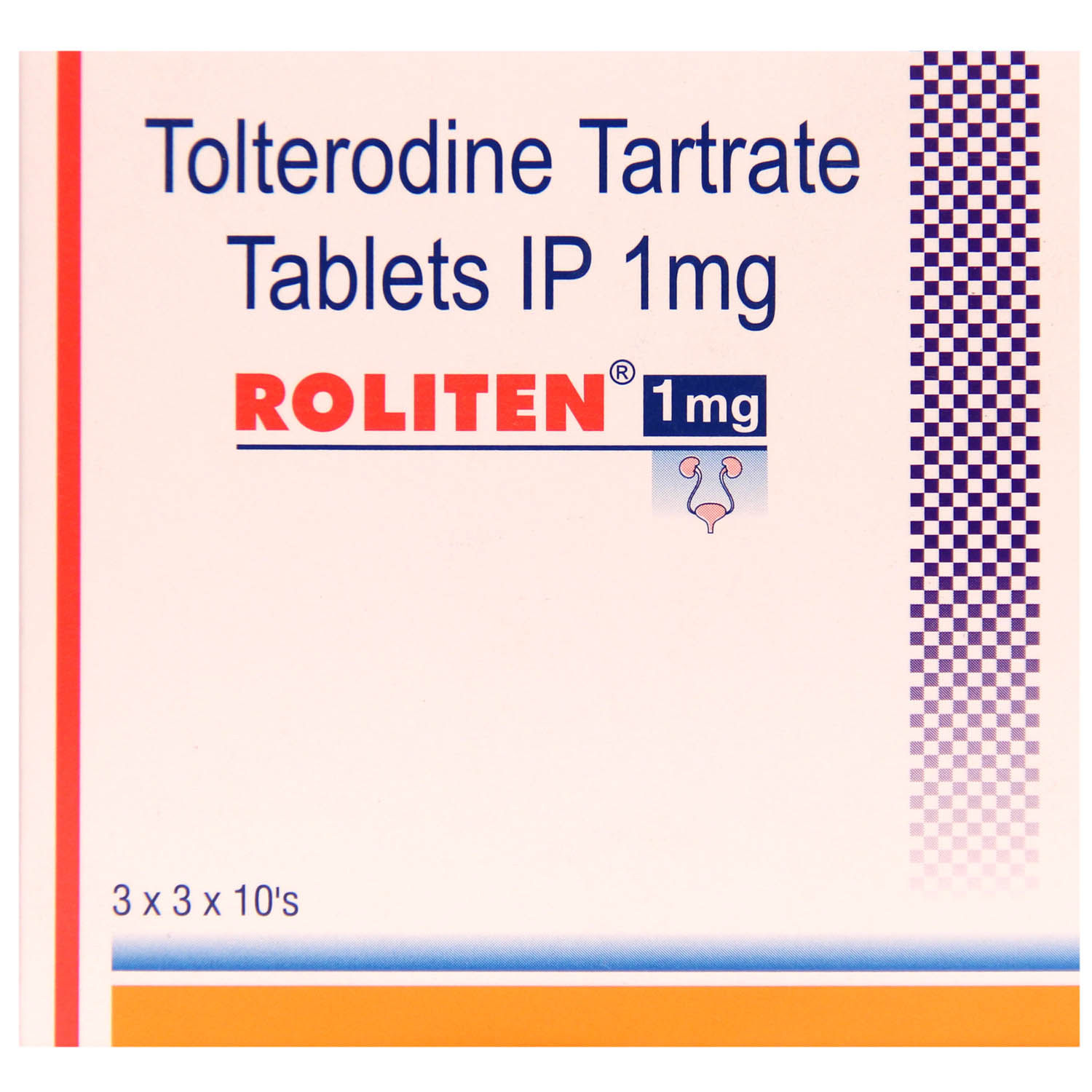About TOLTERODINE+TAMSULOSIN
TOLTERODINE+TAMSULOSIN belongs to a group of medications known as ‘antimuscarinic (muscarinic receptor blockers)’ and ‘alpha-blockers’. TOLTERODINE+TAMSULOSIN is primarily used to treat benign prostatic hyperplasia. Benign prostatic hyperplasia (BPH) is an overgrowth of the prostate gland, a gland situated between the bladder and penis. The prostate gland encompasses the urethra and generates a fluid that forms a part of the semen. Benign prostatic hyperplasia is not cancer.
TOLTERODINE+TAMSULOSIN contains two medicines: Tolterodine (antimuscarinic), and Tamsulosin (alpha-blocker). Tolterodine works by relaxing the urinary bladder muscles and preventing urgent, frequent, or uncontrolled urination. Tamsulosin (alpha-blocker) primarily treats the enlarged prostate gland leading to urinary problems (like difficulty in passing urine and a frequent urination urge). Together TOLTERODINE+TAMSULOSIN works by relaxing the muscle around the bladder exit and prostate gland, so urine is passed more effortlessly. This prevents urgent, repeated, or uncontrolled urination.
Take TOLTERODINE+TAMSULOSIN as prescribed by your doctor. You are advised to take TOLTERODINE+TAMSULOSIN for as long as your doctor has prescribed it for you depending on your medical conditions. You may experience dryness in the mouth, constipation, blurred vision, ejaculation disorder (ejaculate sperm from the penis), and flushing (sense of warmness in the face, ears, neck, and trunk). Most of these side effects of TOLTERODINE+TAMSULOSIN do not require medical attention and gradually resolve over time. However, if the side effects are persistent, reach out to your doctor.
Before starting TOLTERODINE+TAMSULOSIN, please inform your doctor if you have low blood pressure, liver/kidney disease, and heart problems history. If you have myasthenia gravis, and glaucoma then informs your doctor before taking TOLTERODINE+TAMSULOSIN. You are also advised to wear a condom while having sexual intercourse especially when your partner is pregnant, as TOLTERODINE+TAMSULOSIN is known to pass in semen. Do not donate blood while taking TOLTERODINE+TAMSULOSIN. You can donate blood six months after you have taken the last dose of TOLTERODINE+TAMSULOSIN. Patients taking TOLTERODINE+TAMSULOSIN should be cautioned about driving, operating machinery, or performing hazardous tasks as it can cause drowsiness or dizziness.
Uses of TOLTERODINE+TAMSULOSIN
Benign prostatic hyperplasia (BPH)
Medicinal Benefits
TOLTERODINE+TAMSULOSIN contains two medicines: Tolterodine (antimuscarinic), and Tamsulosin (alpha-blocker). TOLTERODINE+TAMSULOSIN is primarily used to treat benign prostatic hyperplasia. They relieve the symptoms of benign prostate hyperplasia. TOLTERODINE+TAMSULOSIN contains Tolterodine which works by relaxing the urinary bladder muscles and prevents urgent, frequent, or uncontrolled urination. On the other hand, TOLTERODINE+TAMSULOSIN contains Tamsulosin (alpha-blocker), which decreases urinary problems, like difficulty in passing urine and a frequent urination urge. TOLTERODINE+TAMSULOSIN makes it easy to pass urine by relaxing the muscles of the gland. Effectively, it improves the symptoms of BPH like urine flow, hesitancy, and incomplete bladder emptying.
Directions for Use
Storage
Side Effects of TOLTERODINE+TAMSULOSIN
- Dryness in mouth
- Constipation
- Blurred vision
- Ejaculation disorder (ejaculate sperm from the penis)
- Flushing (sense of warmness in the face, ears, neck, and trunk).
In-Depth Precautions and Warning
Drug Warnings
TOLTERODINE+TAMSULOSIN should be taken with caution in people with liver or kidney disease, low blood pressure, prostate cancer history, or allergic to TOLTERODINE+TAMSULOSIN, before taking TOLTERODINE+TAMSULOSIN to inform your doctor if you have controlled narrow-angle glaucoma, or stomach or bowel problems (including constipation), or a history of heart rhythm problems (including QT prolongation), gastrointestinal disorders, and myasthenia gravis (a long-term neuromuscular disease that leads to varying degrees of skeletal muscle weakness). TOLTERODINE+TAMSULOSIN contains Tolterodine which has lactose so inform your doctor if you have an intolerance to any sugars. TOLTERODINE+TAMSULOSIN may cause dizziness or blurred vision. So, do not drive or operate any heavy machinery. During sexual intercourse with your partner, use a condom as TOLTERODINE+TAMSULOSIN passes in semen and affect pregnant women and the fetus (unborn child). It is advisable to contact your doctor for advice if you are pregnant or planning to get pregnant before taking TOLTERODINE+TAMSULOSIN. Do not donate blood while taking TOLTERODINE+TAMSULOSIN. In rare cases, problems of penis erection, ejaculation, and pain in the penis can occur. So, if these symptoms are for a longer time, immediately contact your doctor.
Drug Interactions
Drug-Drug Interactions: Care should be exercised when TOLTERODINE+TAMSULOSIN is administered in combination with antibiotics (containing, e.g. erythromycin, clarithromycin), medicinal products used for the treatment of fungal infections (containing, e.g. ketoconazole, itraconazole), medicinal products used for the treatment of HIV, medicines for the treatment of irregular heartbeat (containing, e.g. amiodarone, sotalol, quinidine, procainamide), blood pressure-lowering pills (atenolol, metoprolol, prazosin, terazosin), pain killers (diclofenac, ibuprofen, indomethacin).
Drug-Food Interactions: Avoid taking grapefruit juice and alcohol with this TOLTERODINE+TAMSULOSIN.
Drug-Disease Interactions: TOLTERODINE+TAMSULOSIN should not be given to the people with glaucoma, liver/kidney disease, hypotension (low blood pressure), myasthenia gravis, gastrointestinal disorders, and heart-related diseases (e.g. QT Prolongation).
Drug-Drug Interactions Checker List:
Safety Advice

Alcohol
unsafeTOLTERODINE+TAMSULOSIN should not be taken with TOLTERODINE+TAMSULOSIN as it may cause dizziness and drowsiness. Keep your doctor informed if you drink alcohol.

Pregnancy
unsafeTOLTERODINE+TAMSULOSIN is only for use in male-only and not female.

Breast Feeding
unsafeTOLTERODINE+TAMSULOSIN is only for use in male-only and not female.

Driving
cautionTOLTERODINE+TAMSULOSIN can make some people feel dizzy, so it may affect your ability to drive or operate machinery safely.

Liver
cautionTOLTERODINE+TAMSULOSIN to be taken with caution, especially if you have a history of liver diseases/conditions. The dose may have to be adjusted by your doctor.

Kidney
cautionTOLTERODINE+TAMSULOSIN to be taken with caution, especially if you have a history of kidney diseases/conditions. The dose may have to be adjusted by your doctor.

Children
unsafeTOLTERODINE+TAMSULOSIN is not recommended for children. The safety and effectiveness of TOLTERODINE+TAMSULOSIN have not been established in children.
Habit Forming
Diet & Lifestyle Advise
- Avoid drinking less alcohol, caffeine, and fizzy drink. Limit intake of artificial sweeteners.
- Maintain a healthy lifestyle and exercise regularly so that you do not feel heavy in the abdomen region.
- Also, drink less water in the evening and before sleeping to have a sound sleep and do not wake up frequently for urination.
- Any medication which may worsen urinary symptoms (medication for cold and cough) should be avoided.
Special Advise
- TOLTERODINE+TAMSULOSIN contains Tamsulosin which is not intended for use as an antihypertensive (blood pressure lowering) drug.
- Don't stand suddenly from a lying or resting position which may increase the risk of falls.
- Intake of TOLTERODINE+TAMSULOSIN may occasionally cause blurry vision and dizziness, avoid driving a motor vehicle, operate heavy machinery, and perform hazardous tasks requiring mental alertness.
Patients Concern
Disease/Condition Glossary
Benign prostatic hyperplasia (BPH): It is the enlargement of the prostate gland. It is a non-cancerous growth of the prostate gland caused due to overproduction of dihydrotestosterone hormone in men. After age 50, most men develop an enlarged prostate gland putting pressure on the urinary bladder. It leads to restricted or obstructed urine flow, the urge to urinate frequently (especially at night), and the feeling of not emptying the urinary bladder.




